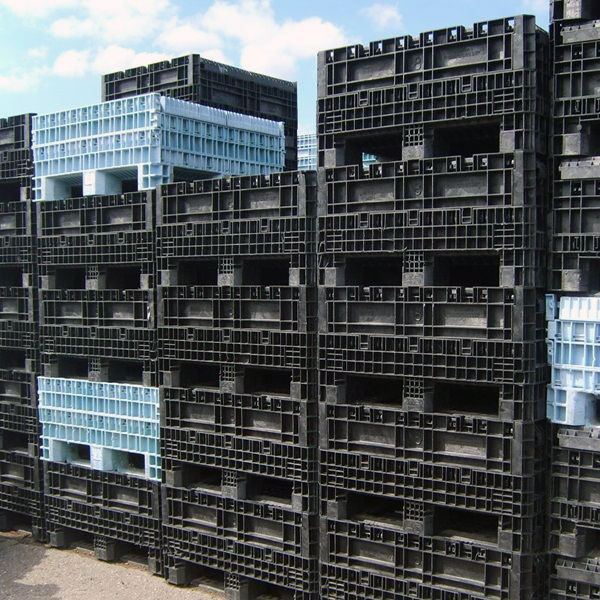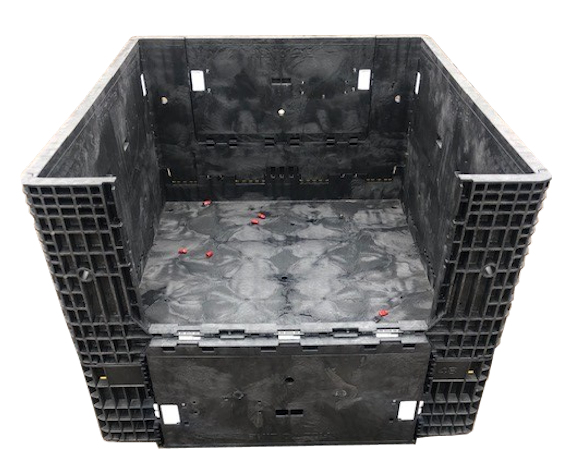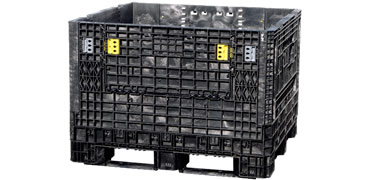Why Bulk Containers Are Important for Affordable and lasting Transportation
Bulk containers play a crucial role in contemporary logistics. They assist in the reliable activity of big amounts of items, consequently maximizing transportation processes. This technique not just reduces prices but likewise lessens environmental impact via lower exhausts and waste generation. As sectors seek even more lasting methods, the adoption of bulk containers is coming to be significantly substantial. What implications does this change hold for future logistics and supply chain management?

The Advantages of Using Bulk Containers in Logistics
Mass containers change logistics by enhancing performance and sustainability. These containers enable the transport of large quantities of products in a solitary journey, markedly decreasing the number of journeys required. This not only improves procedures but also lessens labor costs linked with handling, filling, and unloading. Additionally, bulk containers are made to optimize space utilization within transport automobiles, making certain that even more items can be shipped concurrently.
The standardization of bulk containers also simplifies the logistics process. With consistent measurements, they can be conveniently piled and saved, leading to boosted storehouse administration. Moreover, mass containers frequently feature long lasting materials that shield components from damages during transportation, therefore reducing product loss and raising total dependability. Because of this, services can experience improved supply chain efficiency, ultimately leading to enhanced earnings and customer contentment. This combination of elements makes bulk containers a critical possession in modern logistics.
Ecological Impact: Lowering Waste and Carbon Footprint
As sectors progressively focus on sustainability, the adoption of mass containers has become an essential approach for decreasing waste and lowering carbon impacts. These containers minimize the usage of product packaging materials, such as boxes and plastic, therefore especially decreasing overall waste generation. By consolidating deliveries, mass containers enhance transport performance, enabling for even more products to be moved per trip. This decrease in trips directly correlates with reduced greenhouse gas emissions, contributing to a smaller sized carbon impact.
Mass containers can frequently be recycled or reused, additionally mitigating environmental effect. The durability of these containers assurances they can withstand several transportation cycles, lowering the requirement for single-use options. used collapsible containers. By enhancing logistics and advertising effective resource usage, mass containers not only support sustainable techniques yet likewise motivate industries to align with international ecological goals. Ultimately, their implementation reflects a commitment to environmental stewardship and liable source administration
Cost Cost Savings: Exactly How Bulk Containers Lower Transportation Expenses
While many business look for means to improve their profits, making use of mass containers offers a significant chance for reducing transportation expenditures. Mass containers make the most of the volume of products transferred, permitting services to ship larger amounts at when. This efficiency minimizes the number of journeys called for, directly reducing fuel costs and decreasing labor expenditures connected with loading and unloading.
Furthermore, bulk containers commonly feature structured styles that maximize area usage within transport lorries. This implies fewer vacant spaces, resulting in more reliable use of available capability. Furthermore, the sturdiness of bulk containers can decrease the risk of item damage throughout transportation, guaranteeing and lowering losses that even more goods show up undamaged.
Enhancing Supply Chain Performance With Mass Storage Space Solutions
Mass storage solutions play a crucial role in enhancing supply chain efficiency by enhancing stock administration. By combining goods into fewer, larger containers, businesses can significantly reduce dealing with costs connected with constant transfers and handling. This structured method permits for far better monitoring and management of inventory, ultimately leading to boosted operational efficiency.
Structured Inventory Administration
Reliable supply management is vital for maximizing supply chain procedures, specifically when companies embrace bulk storage space options. These options make it possible for organizations to keep greater stock degrees while decreasing the frequency of replenishment. By combining products into bulk containers, companies can improve their inventory procedures, minimizing the complexity associated with tracking multiple smaller sized packages. This strategy facilitates precise stock counts and improves projecting precision, permitting even more enlightened decision-making. In enhancement, bulk storage space services streamline storehouse company, making it much easier to locate and accessibility products when needed. As an outcome, organizations can attain a much more reliable stock turn over price, eventually boosting general supply chain performance and minimizing the possibility of stockouts or overstock scenarios.

Lowered Handling Expenses
The execution of mass storage space services not just streamlines inventory monitoring yet additionally substantially minimizes handling prices throughout the supply chain. By consolidating products right into bulk containers, firms lessen the need for constant handling and transfer in between various storage space and transportation systems. This approach cuts down on labor prices related to loading, dumping, and relocating smaller sized bundles. Furthermore, bulk storage space minimizes the frequency of deliveries, bring about lower transport expenses and decreased gas consumption. Because of this, companies can optimize their logistics procedures, enabling a more effective allowance of resources. Ultimately, lowered handling prices contribute to enhanced overall supply chain efficiency, fostering an atmosphere that sustains both sustainability and financial practicality.

Adaptability of Bulk Containers Throughout Numerous Industries
Although several sectors have unique demands for transport and storage, mass containers have actually arised as a versatile option that satisfies a vast array of needs. These containers, ranging from large containers to specialized tanks, can accommodate varied materials, including granules, liquids, and powders. In the agricultural industry, mass containers facilitate the transport of grains and plant foods, while the food and drink sector utilizes them for ingredients and ended up products. The chemical sector depends on bulk containers for safely transferring unsafe products, making certain compliance with safety and security guidelines. In addition, building and construction firms profit from mass containers for delivering accumulations and various other materials. Their adaptability reaches different settings of transportation, including trains, ships, and trucks, boosting logistical performance. This adaptability not just simplifies procedures across different fields yet additionally promotes sustainability by decreasing packaging waste and optimizing room en route. Mass containers play an important duty in contemporary supply chain management.
Future Fads wholesale Container Use and Sustainability
The future of bulk container use is progressively shaped by ingenious materials development that enhances sustainability. Additionally, automation in logistics guarantees to streamline procedures, reducing waste and boosting efficiency. Accepting circular economic situation methods will additionally revolutionize exactly how bulk containers are made, utilized, and reused, promoting an extra sustainable transport landscape.
Innovative Materials Growth
As industries progressively focus on sustainability, innovative products growth wholesale containers arises as a significant consider boosting environment-friendly transport services. Suppliers and researchers are checking out eco-friendly plastics, recycled composites, and lightweight metals to lower environmental impact. These materials not just decrease waste but also enhance gas efficiency by lowering the general weight of containers. Additionally, improvements in smart products, which can adjust to varying problems, boost the durability and functionality of bulk containers. The integration of these ingenious materials aligns with round economic situation principles, advertising reuse and recycling. As the need for sustainable methods grows, the development of such materials will play a vital role in shaping the future of bulk container use in logistics and transport.
Automation in Logistics
Significant developments in automation are poised to transform logistics and the utilization of bulk containers, enhancing sustainability in transport. Automated systems, including drones and self-governing vehicles, are streamlining the movement of bulk containers, decreasing the dependence on typical fuel-powered transportation. These innovations enhance transmitting and loading procedures, lessening empty miles and enhancing gas effectiveness. In addition, automated inventory management systems improve monitoring and tracking of mass containers, making sure much better source allotment and minimized waste. The assimilation of the Internet of Points (IoT) allows real-time data evaluation, enabling positive decision-making that lines up with sustainability goals. As automation continues to advance, it is anticipated to drive better developments wholesale container use, anonymous inevitably sustaining more lasting logistics methods and minimizing the environmental impact of transport.
Circular Economic Climate Practices
Innovations in automation are establishing the stage for an extra integrated technique to circular economic climate techniques in the domain of mass container use. As sectors progressively embrace sustainability, mass containers are being created for durability and reusability. This shift not just lessens waste yet also improves source efficiency. Business are embracing methods such as closed-loop systems, where utilized containers are gathered, refurbished, and reintroduced right into the supply chain. In addition, wise technologies track container life cycles, assisting in far better management and reducing environmental influence. The cooperation in between producers, logistics suppliers, and end-users is essential in developing requirements for lasting container usage. used plastic containers. Future trends suggest a growing emphasis on materials that are recyclable and naturally degradable, more reinforcing the round economic situation's concepts wholesale transport

Regularly Asked Questions
What Materials Are Mass Containers Generally Made From?
Bulk containers are commonly constructed from sturdy products such as high-density polyethylene, light weight aluminum, cardboard, and steel. These materials supply protection, toughness, and versatility, making them suitable for carrying numerous items in different industries effectively.
Just how Do I Pick the Right Size Bulk Container?
Selecting the ideal dimension bulk container includes examining the quantity of products to be transferred, thinking about managing tools compatibility, and evaluating storage space requirements. Proper size warranties performance in transportation and minimizes waste during shipment.
Are Bulk Containers Reusable or Recyclable?
Bulk containers are frequently reusable, developed for several trips, boosting sustainability. Several can additionally be reused, relying on the products utilized. Selecting recyclable alternatives additionally sustains ecological objectives and minimizes waste in transport methods.
What Security Regulations Relate To Bulk Container Transport?
Safety and security guidelines for bulk container transport consist of compliance with the Division of Transport guidelines, proper labeling of hazardous materials, architectural stability analyses, and adherence to weight limits to assure risk-free handling and stop accidents during transit.
How Can Businesses Change to Making Use Of Bulk Containers Properly?
Services can change to bulk containers by reviewing existing logistics, training staff on handling, investing in appropriate equipment, enhancing supply monitoring, and teaming visite site up with providers to guarantee compatibility and performance throughout the supply chain.
As industries progressively focus on sustainability, the adoption of bulk containers has actually arised as an essential method for reducing waste and reducing carbon impacts. By combining products right into mass containers, business can enhance their supply processes, decreasing the intricacy linked with tracking multiple smaller bundles. As markets significantly prioritize sustainability, ingenious materials development in mass containers arises as a significant variable in enhancing green transport options. Automated systems, including drones and independent automobiles, are streamlining the movement of bulk containers, minimizing the dependence on typical fuel-powered transportation. In addition, automated try these out supply monitoring systems enhance monitoring and surveillance of mass containers, ensuring far better source allocation and reduced waste.